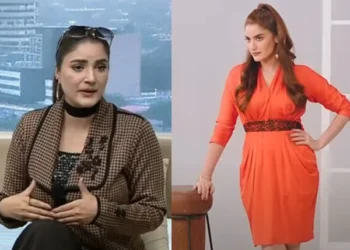Chahat Fateh Ali Khan, a social media personality known for his offbeat singing and controversial videos, is once again in the spotlight — not for a new song, but for the justification of his ambiguous and often criticized lyrics. In a recent podcast interview with host Asif Jatt, Chahat offered his “artistic” rationale for his bold performances and double-meaning songs that have drawn ire from many across Pakistan.
Although Chahat maintains that his videos are harmless entertainment, the widespread criticism and concern — particularly regarding his influence on younger audiences — have only grown louder. His appearance on the podcast has sparked yet another debate about the ethics of viral content, the responsibility of entertainers, and the boundaries between humor, vulgarity, and creativity.
Who Is Chahat Fateh Ali Khan?
Chahat Fateh Ali Khan, whose real name is Kashif Rana, is a UK-based Pakistani expatriate who rose to fame through viral music videos and eccentric content shared across platforms like TikTok, YouTube, and Instagram. His stage name mimics that of the legendary classical singer Nusrat Fateh Ali Khan, leading to early confusion and later mockery from the music industry and the public alike.
Initially dismissed as a joke, Chahat gained massive attention with songs like “Bado Badi,” “Pau Pau,” and “Tun Tun,” which feature low-budget production, awkward choreography, and lyrics with suggestive undertones. While some viewers find his videos humorous and entertaining, others — including parents, educators, and artists — believe his content sets a troubling precedent.
Podcast Controversy: ‘I Am Not Obscene At All’
During the candid podcast conversation with Asif Jatt, Chahat was asked to explain the nature of his suggestive lyrics and overly intimate behavior with women in his music videos. The host referenced Mathira, a well-known model and TV host, who had earlier commented that Chahat “gets a little too bold” when he appears on sets or at public events.
Chahat’s Justification: It’s All ‘Acting’
Chahat dismissed the criticism with nonchalance, claiming:
“I am not obscene at all. It’s all acting. I am not actually doing anything wrong. Everything is just a part of the video.”
He further insisted that there is no malice or real-world intent behind his videos. According to Chahat, his close proximity to female co-stars and seemingly inappropriate gestures are scripted elements of entertainment, meant purely for performance and not reality.
However, critics argue that this reasoning only further blurs the line between what is acceptable as performance art and what constitutes public indecency.
The ‘Pau Pau’ Song and Its Backlash
One of Chahat’s most discussed songs, “Pau Pau,” has been the center of criticism for its double-meaning lyrics that many viewers deem vulgar. When asked about it on the podcast, Chahat at first laughed it off, even reciting the lyrics again — a move many interpreted as tone-deaf.
However, after some pressure from the host, Chahat reluctantly admitted:
“Yes, I should pay a little attention to my language and content.”
The moment was brief, and Chahat quickly shifted back into sarcasm and humor, deflecting the deeper criticism that followed.
Public Reactions and Social Media Backlash
The response to the podcast episode was swift on social media. Many users condemned Chahat for refusing to take accountability for his content, which they claim promotes vulgarity under the guise of humor.
Parents have especially voiced concern over the influence such videos have on younger viewers, who often come across Chahat’s music unintentionally due to its viral nature.
Some users pointed out that the repeated excuse of “it’s just acting” no longer holds water, especially when such content is consumed by millions and circulated without context.
Is Going Viral Worth the Moral Cost?
The podcast conversation raises a broader question: Have we sacrificed quality, values, and ethics in the race for digital fame? Chahat’s success may be accidental or calculated, but it undeniably reflects the trends of current social media culture, where controversy fuels clicks, and shock value earns followers.
The Problem of ‘Anything Goes’ Culture
In an age where content creators chase virality above all else, many fear that the bar for decency is continuously being lowered. Critics believe that Chahat’s songs are just one example of how mediocre, problematic, or ethically questionable content is now normalized — simply because it “entertains” or “goes viral.”
The absence of clear content moderation, especially on platforms like TikTok, further compounds the issue. While some efforts have been made globally to monitor inappropriate content, localized moderation in South Asia remains weak, and Chahat’s videos continue to reach wide audiences.
Industry Voices Join the Chorus of Criticism
It is not just fans or parents raising alarms. Figures from Pakistan’s entertainment and music industry have also questioned whether Chahat’s popularity signals a decline in the country’s artistic standards.
Renowned singer Ali Zafar once commented on the “TikTok-ization of talent,” where genuine artistic skill is increasingly being replaced by gimmicks. While not naming Chahat specifically, his remarks resonate with those who feel that social media fame has become more about theatrics than substance.
Does Responsibility Lie With the Audience?
Chahat, during the podcast, also hinted that audiences are partly to blame for his success. After all, if his videos weren’t watched, liked, and shared in the millions, he wouldn’t be able to produce more content.
This poses a fair question: Should viewers stop engaging with content they find morally objectionable? Or should platforms be held accountable for curating and flagging inappropriate material?
The Road Ahead for Chahat Fateh Ali Khan
Despite the controversy, Chahat Fateh Ali Khan shows no signs of slowing down. In fact, the publicity from such discussions may only fuel his popularity further.
He has already announced upcoming songs, and his followers continue to grow — especially among youth who find his work comically absurd, even if not musically sound.
However, whether his popularity continues to thrive or begins to fade will depend on a mix of public scrutiny, platform regulation, and perhaps his own choices regarding content in the future.
Conclusion: Art or Exploitation?
Chahat Fateh Ali Khan’s rise to viral fame — and his recent defense of controversial songs — opens up an important conversation about responsibility in digital entertainment. While he claims it’s “just acting,” the broader concern remains: When does humor cross the line into vulgarity? And when does entertainment become exploitation?
In the end, Chahat’s strange logic may entertain some, but it fails to answer the growing calls for decency, quality, and responsibility in the rapidly evolving world of Pakistani digital content.

























